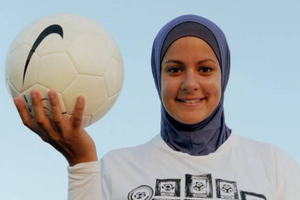
Australian Muslim football player Assmaah Helal has broken barriers to reach football’s elite, but a controversial FIFA ban on Muslim women playing in the hijab means she may never realise her dream of wearing the Australian jersey.
Helal, 25, was introduced to football by her Egyptian-born father when she was just five, and she was determined not to let gender keep her from joining her three brothers on the pitch.
It was no easy task. Members of her Muslim community in western Sydney frowned on the idea of girls playing sport at all, much less a rough and tumble game which was, at that time, still very much a male domain.
“I used to just get told I was a tomboy. In my culture, to play with the guys and to mix with guys was seen as not appropriate,” Helal told AFP.
Helal now plays in the Super League, one step below the nation’s premier W-League for women, and says representing Australia in national side the Matildas would be her ultimate dream.
But devout Muslim beliefs which see her don the hijab to play every weekend mean,for now,such a dream is out of reach.
FIFA banned players from wearing the Islamic headscarf in 2007, claiming it is unsafe, but Helal has never once experienced or heard of a hijab-related injury and has joined growing calls for the ban to be overturned.
“I strongly believe that the ban is just outright discrimination,” she said of the headscarf, which she described as “a part of a Muslim woman’s identity which cannot be changed”.
“At an international and an elite level, sports like taekwondo and rugby allow the headscarf to be worn during the competitive matches, and for the world game, for the universal language that is football, to ban the headscarf… it doesn’t make sense.”
The Asian Football Confederation is leading the charge for the sport’s lawmaking body, the International Football Association Board (IFAB), to lift the ban when it meets this Saturday, March 3.
It has become a pressing issue in the region, with Iran’s national women’s team forced to withdraw from the West Asia Olympic qualifiers last year and three players dropping out of the Jordanian side due to the ban.
AFC vice-president Moya Dodd said the safety concerns had been “fully addressed” by new designs with a velcro front-seam to prevent strangulation and it was a baseless reason to exclude “hundreds of millions” of Muslim women.
“Football, it’s the fastest-growing sport in Asia, and it’s important that people can play also knowing that they can compete at the top level,” Dodd said.
“Sport is the field of dreams. If you take away the dream of playing in an Olympics or playing in a World Cup then it will have an effect all the way down the line.”
Melissa Barbieri, captain of the Matildas and one of Australia’s best-known female footballers, said she had seen great Muslim players “and it scares me to think they won’t be able to play for Australia one day because of religion”.
“We already have so many obstacles in the way of getting equal opportunity in the football world, mostly due to stereotypes and lack of knowledge,” she said, urging FIFA to see the footballers behind the hijab.
“If you just see some of these girls’ skills you would feel obliged to overturn the ban. It would send a thorough ‘Football is the World Game’ message,” added Barbieri.
Sydney sisters Hiba and Hala Ayache, 24 and 26, have been campaigning for nine years to win acceptance of their all-female “Lakembaroos” football club in the local Muslim community and they see the ban as a slap in the face.
“You’re taking it all away, all our hard work,” said Hiba, who has played at state representative level and, like Helal, has international dreams.
“We all have the potential, we have the skills to play further. So it’s not only the boundaries of our family and the community, it also becomes international now. It’s a bit of a burden on us.”
Dodd said only that she’s “hopeful” of having a fair hearing over the ban at the meeting of IFAB, which comprises four members from FIFA and four from British associations.
“I’d like to see a way enabling women with particular cultural beliefs to participate, rather than see it as ground for exclusion,” she said.
“The field should be a field of cultural exchange rather than conflict.”
RELATED:
United Nations urges FIFA to allow hijab headscarf
March 1 2012
http://sports.ndtv.com/football/news/item/186179-united-nations-urges-fifa-to-allow-hijab-headscarf
Geneva: The United Nations has urged FIFA to allow Islamic women to wear a hijab headscarf while playing soccer.
The U.N. says Wilfried Lemke, sports adviser to Secretary-General Ban Ki-moon, has written to FIFA President Sepp Blatter backing a proposal being considered at a meeting on Saturday.
Lemke wrote that “FIFA has the responsibility to ensure that everyone has an equal chance to participate in football.”
FIFA outlawed hijabs for safety reasons in 2007, and allowed a cap which some players object to because it exposes their neck.
FIFA’s rules panel meets in England, and will receive a presentation from FIFA vice president Prince Ali of Jordan to allow a headscarf held in place by a Velcro fastener.



